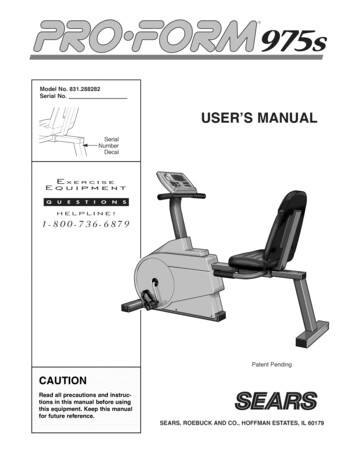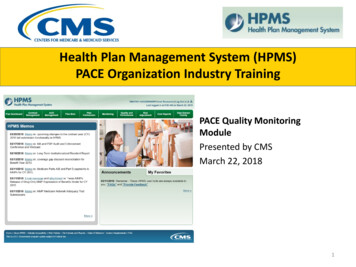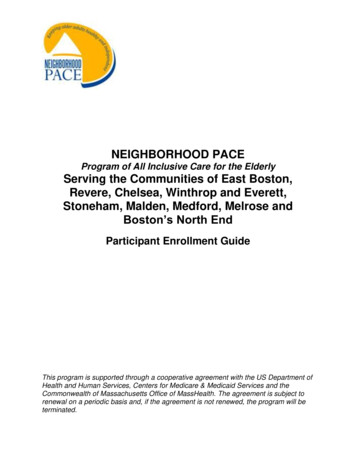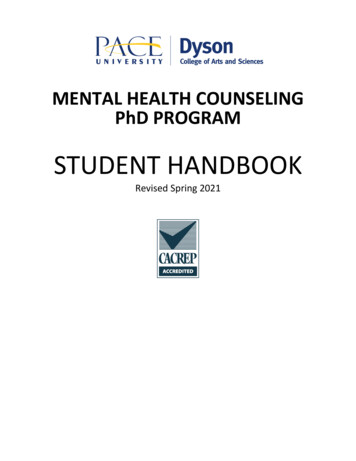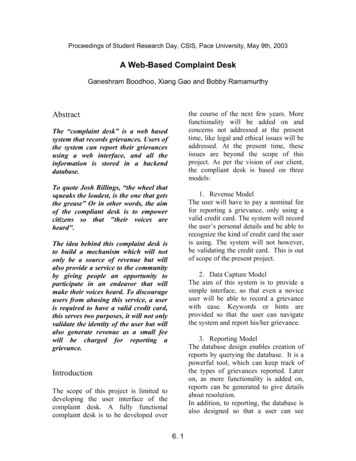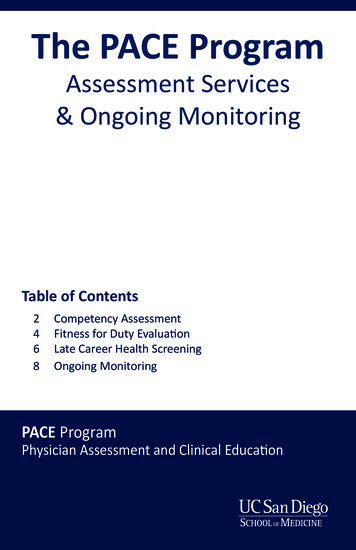
Transcription
The PACE ProgramAssessment Services& Ongoing MonitoringTable of Contents2468Competency AssessmentFitness for Duty EvaluationLate Career Health ScreeningOngoing MonitoringPACE ProgramPhysician Assessment and Clinical EducationThe PACE Physician Competency Assessment Program (updated April, 2022)1
Competency AssessmentThe PACE Clinical Competency Assessment is a high-stakes, rigorousevaluation of a physician’s ability to safely practice medicine. EachCompetency Assessment is specially tailored to the participating physicianand takes into account their:1. Reason(s) for referral2. Current (or intended) scope of practice3. Education, training, and work history4. Lifestyle, health, and wellbeingPhysicians are evaluated in the six general domains of clinical competenceas defined by the American Council for Graduate Medical Education and theAmerican Board of Medical Specialties: patient care, medical knowledge,practice-based learning and improvement, interpersonal and communicationskills, professionalism, and systems-based practice. A physician must becompetent in each of these six domains in order to safely practice medicine.ASSESSMENT COMPONENTSAll assessments will include several corecomponents. Additional components will be chosenbased on the background information provided:Core Components Oral clinical examination Clinical skills simulation Health screening*Additional Components Medical record evaluation Chart stimulated recall Post Licensure Assessment System (PLAS) Exams Other medical specialty consultations or evaluations*When warranted or requested, PACE can provide additional healthrelated evaluations as part of the competency assessment. If impairment issuspected, the physician may be required to undergo a separate fitness forduty evaluation. To learn more about the PACE Fitness for Duty Program,please go to page 4.See the Educational Offerings brochure to learn about the PACE program offerings notincluded here.2The PACE Physician Competency Assessment Program (updated April, 2022)
ASSESSMENT RESULTS AND OUTCOMESFollowing each Competency Assessment, PACE will issue a comprehensivereport summarizing the results. If deficits are identified, a remedial plan willbe created.When there are concerns aboutsafety to practice, PACE mayrecommend practice restrictions and ormodifications.There are four possible outcomesor final grades for the CompetencyAssessment:Category 1: Clear passOverall excellent performance. No concerns or recommendations.Category 2: Pass with minor recommendationsOverall solid performance. Room for improvement. No patient safetyconcerns. Remedial plan will be outlined.Category 3: Pass with major recommendationsOverall marginal performance with significant deficiencies. Remedialplan will be outlined. Physician is likely to require oversight and/orpractice restrictions.Category 4: FailCurrently unsafe to practice. Recommended remediation, whenapplicable, will be outlined.ASSESSMENT FORMAT AND OTHER INFORMATIONSince the pandemic began in March 2020, PACE evaluated all components ofour Competency Assessment to see which could be administered remotely.The goal was to minimize human contact that could spread COVID-19 withoutsacrificing the integrity of our Assessment.As a result, all Assessments are now conducted in a hybrid format with someelements conducted remotely (e.g. oral clinical exams) and some in-person(e.g. clinical skills simulations).The in-person elements will take place over 1-2 days for most physicians. Dueto the high degree of customization, the total cost and duration will vary foreach physician.Due to the complexity and high-stakes nature of the program, it can takeseveral months to complete the Competency Assessment.Please visit our website (paceprogram.ucsd.edu) or give us a call (619.543.6770) tolearn more about the Physician Competency Assessment.The PACE Physician Competency Assessment Program (updated April, 2022)3
PACE Fitness for Duty (FFD)EvaluationThe Fitness for Duty Evaluation is an integrative, multi-faceted assessment ofa physician’s fitness for occupational functioning with the goal of determiningwhether they are fit to perform their job duties without risk to patients, self,or others.Should impairment be found, the program willidentify which duties the physician would be able tosafely continue performing independently – if any –and whether or not accommodations could be madeto enable the physician to safely perform some or allother job duties.Based on years of experience performing assessmentsof physician competence, we have learned that nosingle test or process provides consistent, reliableresults. Consequently, multiple components of thecustomized assessment are incorporated into anoverarching integrative assessment of fitness.FFD EVALUATION COMPONENTSThough each FFD evaluation is different, all evaluations will include: Review of collateral information Medical examination Cognitive testingBased on the presenting information, additional components will be selectedand may include any of the following: Specialty medical examination Psychiatric evaluation Simulated procedural/skills evaluation Toxicology screening/addiction evaluation Neuropsychological evaluation Occupational testing Physical stamina evaluationPlease visit our website (paceprogram.ucsd.edu) or give us a call (619.543.6770) tolearn more about the Fitness for Duty Program.4The PACE Physician Competency Assessment Program (updated April, 2022)
When Should A Physician Undergo a FFD Evaluation?There are many health conditions which can have a deleteriousimpact on clinical performance and personal health and wellbeing.Some of the more common conditions include: Psychiatric or behavioral concerns Neurological or progressive neurodegenerative conditions Psychiatric or behavioral disorders Substance use disorders Decline in cognition or in physical or mental staminaA FFD Evaluation should also be considered when a physician is seeking toreturn to work following a leave of medical absenceFFD EVALUATION RESULTS AND OUTCOMESFollowing each FFD Evaluation, PACE will issue a comprehensive reportsummarizing the results. Possible results of the Fitness Evaluation include: Fit for dutyNo presence of illness exists that interferes with the physician’sability to safely perform the duties of their job.Fit with accommodation(s)Presence of illness exists that interferes with the physician’s abilityto safely perform some, but not all duties of their job. PACEwill provide guidance on possible methods of accommodation.Unfit for dutyPresence of illness exists that interferes with the physician’s abilityto safely perform most or all of the duties of their job. Thephysician presents a significant risk to patients, self, and others. It isunlikely that any reasonable accommodations could be made thatwould allow the physician to practice safely.FFD FORMAT AND OTHER INFORMATIONDue to the nature of the Fitness for Duty Evaluation, most components of itwill be conducted in person in San Diego.The in-person elements will take place over 1-2 days for most physicians. Dueto the high degree of customization, the total cost and duration will vary foreach physician.The PACE Physician Competency Assessment Program (updated April, 2022)5
Late Career Health Screening(LCHS)The UCSD LCHS is a physical andmental health screening intended forlate career physicians and healthcareprofessionals who have reached acertain age (generally 70 and older), butotherwise have no known impairmentor competency problems.The LCHS is designed to detect thepresence of any physical or mental health problems affecting a physician’sability to practice. If concerns are identified, further evaluation will berecommended. The LCHS is not a diagnostic evaluation nor is it a fitness forduty evaluation. It is not intended to be used in “for cause” assessments ofphysicians who are suspected of having impairment.LCHS COMPONENTSEach LCHS evaluation will include the following components: Review of self-report health questionnaires History and physical examination Cognitive screening examination Mental health screening Dexterity testing (only required for proceduralists)LCHS RESULTS AND OUTCOMESFollowing the LCHS, a final report will be sent to the referring group thatoutlines whether the physician falls into one of the following two categoriesand what the recommendations are: No further evaluation recommendedResults indicate that no presence of illness exists that interferes withthe physician’s ability to safely perform the duties of his or her job.Re -evaluation may be recommended depending on the prognosis ofpresent illness(es). Further evaluation recommendedResults indicate a possible impairment exists due to a physical or mentalhealth problem. Specific recommendations will be outlined.Please visit our website (paceprogram.ucsd.edu) or give us a call (619.543.6770) tolearn more about the UCSD Late Career Health Screening (LCHS).6The PACE Physician Competency Assessment Program (updated April, 2022)
LCHS FORMAT, SCHEDULING AND PRICINGEach LCHS will be conducted in-person at the PACE office in San Diego and willtake between 2-4 hours to complete. Reports will be issued within 2-4 weeksfollowing the in-person screening.Most physicians will complete their LCHS, from application to final report,within 4-6 weeks.The cost of the LCHS ranges from 2,000 - 2,200 depending on thephysician’s area of practice.WHY CONSIDER AN AGE-BASED SCREENING?Physicians, like everyone else, are not immune to the effects of the naturalaging process. This includes decreases in physical strength, stamina andmotor skills as well as in cognitive abilities such as reaction time, learningnew concepts and skills, comprehension of complex information, and analyticprocessing.According to the Federation of State Medical Board Census of LicensedPhysicians, 2020, 19.4% of physicians were 60-69 years’ old and 11.8% were70 or older.Unlike the airline industry, which requires biannual medical examinationsof commercial pilots and mandatory retirement at age 65, Medicine doesnot require physicians to undergo regular medical examinations nor does itmandate when they must stop practicing. Instead, we rely mainly on physicianself-regulation. However, the impaired physician is often the last to know ofhis or her own impairment.As a result, many impaired physicians may be practicing without realizing thattheir ability to deliver safe care has been compromised. As such, determiningwhich individuals may pose a safety risk is the responsibility of those in thehospital or other medical settings.The PACE Physician Competency Assessment Program (updated April, 2022)7
The Physician EnhancementProgram (PEP): OngoingMonitoring and MentoringThe PACE Physician Enhancement Program (PEP) is an on-site, in-practicementoring program designed to assist the practicing physician attain thehighest standards of professional growth and clinical excellence. It provideslongitudinal assessment, education, and practice-based improvement toparticipating physicians.HOW PEP IS DIFFERENT FROM OTHER TYPES OFMONITORING PROGRAMSOur goal is to use independent and well qualified practice monitors who canprovide objective oversight and assessment of the participating physicians'clinical practices and help them improve.To achieve this goal, we carefully vet each potential new monitor. If selected,our monitors receive a detailed orientation and training process prior tostarting. The vast majority of our monitors are academic faculty members ofthe UCSD School of Medicine, who are experienced clinicians, assessors, andeducators.PEP was created to aid state medical boards in providing high quality practicemonitoring services to physicians. PEP is recognized by the Medical Boardof California as an official alternative to having a practice monitor. We haveprovided PEP services to physicians practicing other states as well.Prices range with specialty and special focus of the program. We offer flexiblepayment plans.Please visit our website (paceprogram.ucsd.edu) or give us a call (619.543.6770) tolearn more about the UCSD Physician Enhancement Program (PEP).8The PACE Physician Competency Assessment Program (updated April, 2022)
PEP COMPONENTS AND HIGHLIGHTSEach PEP mentor will tailor the program around the needs of the physicianbeing mentored. However, each program will follow a general format andwill include the following components: Initial and semi-annual on-site Practice Review using standardizedinstruments & procedures conducted by PACE faculty Interval Review of Professional Growth & Education to identifystrengths and/or deficits contributing to overall clinical practice andmedical knowledge Individualized Personal and Practice Development Plan (PPDP)including the development & conduct of quality improvement andpractice-based research projects to enhance clinical performance &behavior Monthly Chart Audits using standardized instruments & procedures Monthly phone conversations with PACE faculty reviewing chartaudits, Practice Review Results and progress on PPDP Summary reports provided to the referring agency each quarterAdditional Components Available: Assistance with EHR & other technological advancements Scholarly discussions Professional improvement plans Billing & coding monitoring and PULSE Survey 360 workplace assessment with individual feedbackPEP STUDY: CHARTING CHANGES OVER TIME1Overall lsMonth 1Month 12Percent Change12 (36.36%)17 (51.5%)4 (12.12%)33 (100%)2 (6.06%)22 (66.67%)9 (27.27%)33 (100%)-83.33% 29.41% 125%0 10 of the 12 physicians who had Unsatisfactory Ratings in Month 1improved by Month 12 4 of the physicians with Satisfactory Ratings achieved Superior Ratingsby month 12 No physicians displayed a deterioration in charting skills over 12 monthsin the PEP programImproving Charting Skills of Physicians in Monitored Practice, J Contin Educ Health Prof. Fall2018; 38 (4): 244-2491The PACE Physician Competency Assessment Program (updated April, 2022)9
PACE at a GlanceThe UC San Diego PACE Program is an industry leader in the fields ofcompetence assessments, age-based screening evaluations, fitness for dutyevaluations, monitoring, remedial education, disruptive behavior programsand customized solutions for healthcare professionals.Founded in 1996, the PACE Program has been devoted to a mission ofimproving the quality of healthcare by offering assessments and focusededucation to medical professionals throughout our nation. PACE has assessedover 2000 physicians, provided educational services to over 6000 physiciansand allied health professionals and provided ongoing monitoring to over 300physicians.We aim to provide the highest quality programs possible that can assistregulatory agencies with public protection and to serve as a resource tohospitals, health systems and to individual healthcare providers.PACE is administratively housed within UC San Diego School of Medicine,Department of Family Medicine. We are a fully self-funded program andreceive no funding from UCSD nor any outside agencies.If you are interested in learning more about PACE and any of its offerings,please give us a call or visit our website.Scan QR Code to learnmore about PACEUC San Diego PACE ProgramMailing Address:200 West Arbor Drive, #8204San Diego, CA 92108-8204T: 619.543.6770F: 619.488.6078E: ucpace@ucsd.edupaceprogram.ucsd.edu10The PACE Physician Competency Assessment Program (updated April, 2022)
4 The PACE Physician Competency Assessment Program (updated April, 2022) PACE Fitness for Duty (FFD) Evaluation Please visit our website (paceprogram.ucsd.edu) or give us a call (619.543.6770) to learn more about the Fitness for Duty Program.

